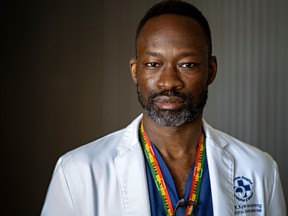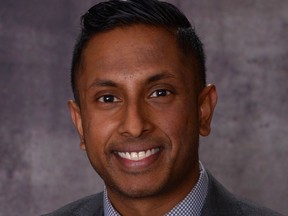A new study by Ottawa researchers found that survivors of ECMO had a 24 per cent higher rate of mental health diagnoses after discharge compared to other ICU survivors.

Article content
It has been called life support of the last resort, and during the pandemic ECMO, or extracorporeal membrane oxygenation, has helped pull some critically ill patients back from the brink of death.
Advertisement 2
Article content
But treatment with the advanced form of life support appears to come at a cost for some patients, according to a new study by Ottawa researchers.
Article content
The study, published in JAMA this week, found that survivors of ECMO had a 24 per cent higher rate of mental health diagnoses after discharge compared to other ICU survivors.
“We already knew that ICU survivors can suffer mental health impacts from the trauma of invasive treatments, living with new physical limitations and dealing with long recovery times,” said lead author Dr. Shannon Fernando, a critical care physician at Lakeridge Health and postdoctoral fellow at The Ottawa Hospital and the University of Ottawa.
“We suspected ECMO survivors would be at greater risk of mental health impacts because they are sedated and ventilated for longer and often face a more challenging recovery. But we didn’t have clear data until now.”
Advertisement 3
Article content
ECMO, which temporarily replaces the heart and lungs of patients suffering from heart or respiratory failure, is used at five centres in Ontario, including the University of Ottawa Heart Institute.
The timing of the research is particularly relevant, say researchers, because use of ECMO grew worldwide during the COVID-19 pandemic to address record numbers of patients with severe respiratory failure. At one point, Ontario had twice as many patients on ECMO as it did pre-pandemic. It has typically been used infrequently because of limits on who qualifies and would benefit from use.
“We suddenly have a lot more ECMO survivors because of COVID-19,” said Dr. Kwadwo Kyeremanteng, co-senior author and scientist and critical care doctor at The Ottawa Hospital. “We need to make sure they have the mental health support they need to recover and survive.”
Advertisement 4
Article content

Because it is so invasive, ECMO is generally used on younger patients. About 50 to 65 per cent of those who receive the treatment survive and most are alive five years later, said Fernando.
The researchers from The Ottawa Hospital, the Institut du Savoir Montfort, ICES and the University of Ottawa studied health records from all ICU survivors in Ontario between April 2010 and March 2020. They matched 642 ECMO survivors with 3,820 ICU survivors who had similar characteristics, including age, sex, mental health history severity of illness and length of stay.
Thirty seven per cent of the ECMO survivors were diagnosed with a new mental health condition, such as depression, anxiety and traumatic disorders, a 24 per cent higher rate of new mental health diagnoses than the other ICU survivors.
Advertisement 5
Article content
Fernando led earlier research that found survivors of ICU are at higher risk of suicide and self harm after discharge. He said further heightened suicide and self-harm risk was not seen in the study on ECMO patients, but the research calls for a greater focus on the mental health of patients discharged from ICU and especially those who received ECMO treatment.
“Patients will need help long after they leave the ICU.”
Fernando said he has cared for patients recovering after receiving ECMO treatment. Patients would frequently describe nightmares and recurrent thoughts that were in keeping with post-traumatic stress disorders.

“It became clear it was exceedingly common.”
Knowing that can help to reassure patients, said co-senior author Dr. Peter Tanuseputro, physician-scientist at The Ottawa Hospital and ECES and investigator at the Bruyère Research Institute.
“As care providers, we can tell our patients that its common to struggle with your mental health after an ICU admission. ICU survivors need to realize that they often face months or years of recovery and families and healthcare providers need to support them.”
The full study can be found here.
For more health news and content around diseases, conditions, wellness, healthy living, drugs, treatments and more, head to Healthing.ca – a member of the Postmedia Network.
What's ECMO therapy? It saves the lives of COVID-19 patients, but the treatment can lead to higher mental health diagnoses - Vancouver Sun
Read More

No comments:
Post a Comment